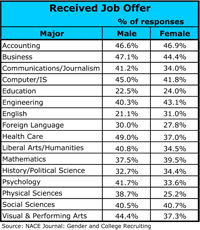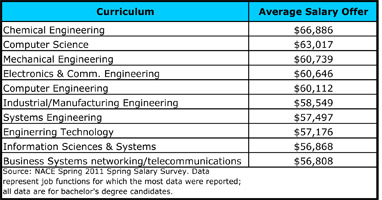
It’s no secret that there has been sweat building up underneath soon-to-be-graduates’ mortarboards since the economy’s demise in 2008. As 1.7 million students graduate with their bachelor’s degrees in the winter-spring session, according to the U.S. Department of Education, some may already have jobs waiting for them. However, according to the U.S. Bureau of Labor Statistics (BLS), the unemployment rate as of April 2011 is a staggering 9.0 percent. Though, the employment outlook varies depending on the area and type of work. What exactly can these recent graduates expect as they take off their caps and gowns?
According to the U.S. BLS, there will be an expected change in 289 occupations. For example, business occupations in particular, including financial analysts, management analysts and personal financial advisors, are projected to experience an increase of 20 percent or more.
The National Association of Colleges and Employers (NACE) indicates that businesses plan to hire 21 percent more recent graduates this year than they did in 2010. The NACE also reports that employers are most interested in hiring graduates with engineering, computer science and accounting or business degrees.
 But finding a job is only half the battle. The other half includes landing a job that will pay enough to make those student loan payments on time. NACE’s Spring 2011 Salary Survey states that the average salary offer to all 2011 graduates is calculated to be $50,462, which is an increase of 5.9 percent over 2010 graduates. Some of the highest paid graduates will be those majoring in engineering, with majors including chemical engineering, mechanical engineering and engineering technology boasting average starting salaries of at least $57,000 and up. The overall average salary offer to business majors is a key contributing factor in the increase to all graduates as well. The average salary offer as a group has risen 6.2 percent over last year’s average from $46,623 to $49,525. Business students earning marketing degrees also saw a similar increase. Business administration/management graduates posted the largest increase to their average salary offer, which leapt 11.3 percent to $46,832.
But finding a job is only half the battle. The other half includes landing a job that will pay enough to make those student loan payments on time. NACE’s Spring 2011 Salary Survey states that the average salary offer to all 2011 graduates is calculated to be $50,462, which is an increase of 5.9 percent over 2010 graduates. Some of the highest paid graduates will be those majoring in engineering, with majors including chemical engineering, mechanical engineering and engineering technology boasting average starting salaries of at least $57,000 and up. The overall average salary offer to business majors is a key contributing factor in the increase to all graduates as well. The average salary offer as a group has risen 6.2 percent over last year’s average from $46,623 to $49,525. Business students earning marketing degrees also saw a similar increase. Business administration/management graduates posted the largest increase to their average salary offer, which leapt 11.3 percent to $46,832.
When it comes to college recruiting and gender proportions, recent trends show that the role women play in the future professional workforce will be dominant, according to the NACE Journal. Further, between 2003 and 2009, women averaged 57.3 percent of bachelor’s degree graduates at all four-year, degree-granting institutions in the United States. The NACE also reports that the ratio of men to women graduates barely deviated throughout the time period, meaning eventually, the college-educated professional labor force would become predominately female. For young, entry-level employees within the age category of 20 to 24, women have made up a majority of the college-educated workers at about 59 percent by the end of 2010.
Though women are accounting for more of the professional workforce, men are still offered a higher median salary than women. The median salary offer to males who have their bachelor’s degree amounts to $44,159, whereas women have an expected median salary of $36,451, according to the NACE Journal.
While statistics indicate that this year’s graduates have fewer worries than the classes before them, other statistics reveal the current status of individuals who graduated between 2006 and 2010—it is much more sobering. According to a survey performed by staffing agency Adecco, only 57 percent of recent graduates are working full time, and 43 percent of recent graduates who do have full-time jobs are working in positions that do not require a four-year degree. Of course, these figures are disconcerting considering the average student debt in 2010 was approximately $24,000, according to the Project on Student Debt, an annual analysis of student loan debt at more than 1,000 public and private non-profit fouryear institutions.
Of those recent graduates, about 71 percent indicated they would have tried to better prepare for the job market while in college, according to the Adecco College Graduate Survey. For instance, graduates would have taken advantage of networking opportunities, started the job search earlier and applied for more jobs.

CareerBuilder’s annual college job forecast indicates employers are primarily looking for skill sets that include strong written and verbal communications, project management, research and math skills. Many employers may also benefit in hiring newcomers in the business world not necessarily for their experience, but because they are more willing to tailor themselves to the new work environment they are now entering for the first time. Recent graduates are also more likely to be up-to-speed on any technological advances within a particular industry.
Overall, as so many enter what is called the “real world” without spring breaks or three-month vacations, they can at least expect to be a part of the professional workforce in a somewhat healthier economy than in years past. And employers can expect to have many eager applicants applying for interviews…but that’s another story.




This is just another article proving that going further with your education can only help. In a lot of companies promotions do come within and putting your time in that company, but having that educational background is only a stepping stone to get you to a higher salary. Maybe in some instances companies might not take that into effect when discussing your salary but it just a helpful tool in starting off negotiations.